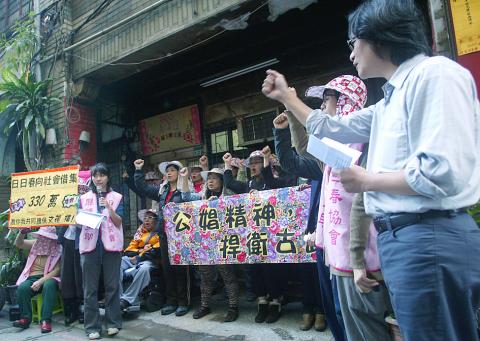A heritage site in Taipei that has preserved more than 70 years of history as a brothel, which was opened to the public under the management of the Collective of Sex Workers and Supporters (COSWAS), may have to close down because the new property owner had asked the group to move out of the building.
The Wen Men Building, a two-story building constructed in 1925, mainly served as a brothel for the working class during the Japanese colonial period. It became a legal brothel in 1956 and was a popular place for years until the Taipei City Government outlawed sex work in 1997, COSWAS secretary Wu Jo-ying (吳若瑩) said.
Licensed sex workers were totally banned in 2001, Wu said.

Photo: CNA
Inside the building were small rooms, each featuring a bed with floral-patterned sheets and a small dresser. Pictures of people who used to work in the building still hung on the walls, along with a faded notification paper from the city government in 1978 prohibiting people under the age of 20 from entering the building.
COSWAS, a group that supports licensed sex workers and promotes the legal working rights of women in the sex trade, had rented the first floor of the building for the past 14 years, using it as an office and an educational site for the public to learn about the history of the sex industry.
Although the building has been designated a municipal heritage site by the city’s Department of Culture Affairs in 2006, the new property owner, surnamed Liu (劉), who bought the building last year, filed a lawsuit against the group, asking it to move out.
The Shihlin District Court (士林地方法院) ruled against COSWAS last month, demanding the group vacate the building. The ruling has allowed Liu to proceed with the group’s eviction.
COSWAS and support groups held a press conference in front of the building yesterday morning, calling for the conservation of the cultural heritage site.
Wu said the group suspected that the new owner’s intention is to sell and profit from the transfer of development rights on a heritage site or for urban renewal after buying the land from the Bank of Taiwan.
COSWAS executive director Chung Chun-chu (鍾君竺) said the group had received funding from the Department of Culture Affairs in the past, but it was not informed of the property transfer until it was asked to move out by the new owner.
Wu said the department had neglected its duty by not giving the group pre-emptive rights, as stipulated in the Cultural Heritage Conservation Act (文化資產保存法), to purchase the building to preserve its cultural significance.
Based on the court’s ruling, the eviction can be temporarily halted if the group posts bond in the amount of NT$3.3 million (US$111,486), Wu said, adding that the group was seeking funding from the government as well as from the public.
John Liu (劉可強), a professor at National Taiwan University’s Graduate Institute of Building and Planning, said allowing former workers to narrate the building’s history was important in preserving the cultural meaning of Wen Meng Building.
Since the new Cabinet has said it would promote social justice, it should respect the history of such cultural sites.
“The government should allow cultural diversity in society and should not allow economic growth to take precedence over cultural values,” said Lee Hsiu-chien (李修鑑), a cultural history workshop owner.
COSWAS said it would appeal against the ruling and continue to seek support to keep the last remaining brothel heritage building.

Taiwan is stepping up plans to create self-sufficient supply chains for combat drones and increase foreign orders from the US to counter China’s numerical superiority, a defense official said on Saturday. Commenting on condition of anonymity, the official said the nation’s armed forces are in agreement with US Admiral Samuel Paparo’s assessment that Taiwan’s military must be prepared to turn the nation’s waters into a “hellscape” for the Chinese People’s Liberation Army (PLA). Paparo, the commander of the US Indo-Pacific Command, reiterated the concept during a Congressional hearing in Washington on Wednesday. He first coined the term in a security conference last

Prosecutors today declined to say who was questioned regarding alleged forgery on petitions to recall Democratic Progressive Party (DPP) legislators, after Chinese-language media earlier reported that members of the Chinese Nationalist Party (KMT) Youth League were brought in for questioning. The Ministry of Justice Investigation Bureau confirmed that two people had been questioned, but did not disclose any further information about the ongoing investigation. KMT Youth League members Lee Hsiao-liang (李孝亮) and Liu Szu-yin (劉思吟) — who are leading the effort to recall DPP caucus chief executive Rosalia Wu (吳思瑤) and Legislator Wu Pei-yi (吳沛憶) — both posted on Facebook saying: “I

Sung Chien-liang (宋建樑), who led efforts to recall Democratic Progressive Party (DPP) Legislator Lee Kun-cheng (李坤城), was released on bail of NT$80,000 today amid outcry over his decision to wear a Nazi armband to questioning the night before. Sung arrived at the New Taipei District Prosecutors’ Office for questioning in a recall petition forgery case last night wearing a red armband bearing a swastika, carrying a copy of Adolf Hitler’s Mein Kampf and giving a Nazi salute. Sung left the building at 1:15am without the armband and covering the book with his coat. Lee said today that this is a serious

A mountain blaze that broke out yesterday morning in Yangmingshan National Park was put out after five hours, following multi agency efforts involving dozens of fire trucks and helicopter water drops. The fire might have been sparked by an air quality sensor operated by the National Center for High-Performance Computing, one of the national-level laboratories under the National Applied Research Laboratories, Yangmingshan National Park Headquarters said. The Taipei City Fire Department said the fire, which broke out at about 11am yesterday near the mountainous Xiaoyoukeng (小油坑) Recreation Area was extinguished at 4:32pm. It had initially dispatched 72 personnel in four command vehicles, 16